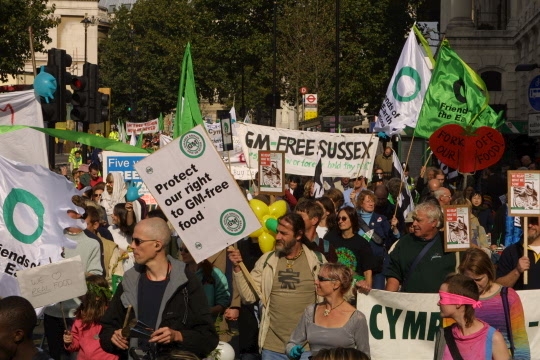Biodiversity : between « open source » and state sovereignty
n°162 - janvier / mars 2021The conditions to the access and use of information recorded in databases are the subject of fierce international debate. For some, it is a question of « protecting » their national resources and biodiversity, and for others one of « avoiding » current regulations. The ability to patent living organisms on a massive scale is a key issue that […]
Biopiracy on digitalized sequences : two examples
#162 - 2021 - january - marchIf cases of biopiracy of living organisms based on digital sequence information (DSI) are not frequent for the moment, Inf’OGM is aiming to show that they are not just figments of the imagination. Without a strong reaction from the international community, the two examples presented here (the Ebola virus in West Africa and a GM […]
What legislation for the digitilization of life and benefit sharing ?
#162 - 2021 - january - marchIf free access to « digital sequence information » (DSI) of living organisms were to be unconditional, it would come up against the fair and equitable sharing of the benefits generated by the use of any physical genetic resource. Because this sharing of physical genetic resources is actually taking place within a framework of existing international […]
Genetic resources : the wrong « label » ?
#162 - 2021 - january - marchWhat does the expression “genetic resource” really mean ? Of course, the word “genetic” is well-known and refers to the genome of living beings : their DNA or genetic “material”, but is this its present-day meaning ? And what about the addition of the word “resources” ? There is also the mention of the « digitalization of genetic resources” […]
Digitalization of living beings, for easier privatization
#162 - 2021 - january - marchEver since the 1992 convention on biological diversity, “genetic resources” have been under state sovereignty. On signing this convention the poorer countries of the world were able to state that “although industrially poor, we do at least have “green gold” : our biodiversity”. A variety of international texts subsequently guaranteed the exploitation of this wealth […]
It really is possible to trace the new GMOs
n°161 - octobre / décembre 2020Over the past few years companies have been forwarding the argument that the traceability of certain new GMOs would be impossible. However, that such traceability techniques do exist is proved by their current standardization by the international authorities in other domains as well as their routine use by the companies. In 2017, the […]
Biotechnologies : the power of words
n°161 - octobre / décembre 2020Words, by guiding our thoughts, guide our actions. In the field of biotechnology, it is essential to be aware of unstated intentions. Other peoples’ language, whether accepted or used without a critical eye, may force our consent. Somewhere between self-confirming statements (tautology), false logic (sophism) and authoritative arguments (rhetoric) the following cases of discursive strategy […]

Actions against GMO in United Kingdom
n°145 - mai / juin 2017GM tomato paste was the first product sold in the UK, but this was soon withdrawn. Protests against Monsanto’s GM RoundUp Ready soy imports began in 1996, including some high profile direct actions against shipments. Consumer actions included voluntary labelling of supermarket products with stickers, and handing out leaflets outside stores. In 1998, Iceland became […]
Citizens vs growing number of new techniques of biotechnology
n°126 - janvier / février 2014GMOs have been under discussion in Europe since the end of the 1990s. The subject has mobilised a broad spectrum of civil society. But the GMO acronym generally refers only to transgenic organisms, whereas over the last 15 years the biotech companies have developed “new techniques” for modifying living organisms. These developments have been – […]
EUROPE – Amflora : Illegal authorisation French experts say
n°107 - novembre / décembre 2010In January and July 2010 the French High Council of Biotechnologies (Haut conseil des biotechnologies, HCB) delivered two critical assessments concerning the application for commercial authorisations for a transgenic sugar beet (1) as well as a transgenic potato (2). The main reservation concerns the detection and quantitation methods provided by the companies and which have […]

